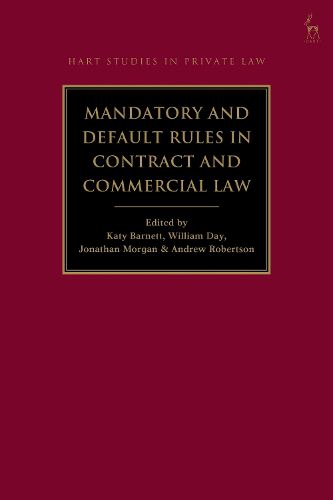Readings Newsletter
Become a Readings Member to make your shopping experience even easier.
Sign in or sign up for free!
You’re not far away from qualifying for FREE standard shipping within Australia
You’ve qualified for FREE standard shipping within Australia
The cart is loading…






Some legal rules governing commercial transactions operate as defaults, which can be modified or excluded by the parties, while others are mandatory, or non-excludable. This collection explores the nature of mandatory and default rules and the complicated relationship between them.
Four issues receive close attention. The first is taxonomy: the collection distinguishes between different kinds of mandatory and default rules that govern commercial transactions. The second issue is justification. Where rules are mandatory, are there clearly understood and convincing reasons for parties to be denied choice? In the case of default rules, on what basis is the default position selected? The third issue is the relationship between default rules and interpretation, and, relatedly, between default rules and contractual risk allocation. The application of default rules inevitably raises interpretive issues, and certain problems can be addressed either by way of a default rule or the identification of implicit allocations of risk. The fourth issue is the relationship between mandatory and default rules, which is revealed to be more akin to a spectrum, with shades of compulsion and optionality, rather than a binary divide.
$9.00 standard shipping within Australia
FREE standard shipping within Australia for orders over $100.00
Express & International shipping calculated at checkout
Stock availability can be subject to change without notice. We recommend calling the shop or contacting our online team to check availability of low stock items. Please see our Shopping Online page for more details.
Some legal rules governing commercial transactions operate as defaults, which can be modified or excluded by the parties, while others are mandatory, or non-excludable. This collection explores the nature of mandatory and default rules and the complicated relationship between them.
Four issues receive close attention. The first is taxonomy: the collection distinguishes between different kinds of mandatory and default rules that govern commercial transactions. The second issue is justification. Where rules are mandatory, are there clearly understood and convincing reasons for parties to be denied choice? In the case of default rules, on what basis is the default position selected? The third issue is the relationship between default rules and interpretation, and, relatedly, between default rules and contractual risk allocation. The application of default rules inevitably raises interpretive issues, and certain problems can be addressed either by way of a default rule or the identification of implicit allocations of risk. The fourth issue is the relationship between mandatory and default rules, which is revealed to be more akin to a spectrum, with shades of compulsion and optionality, rather than a binary divide.